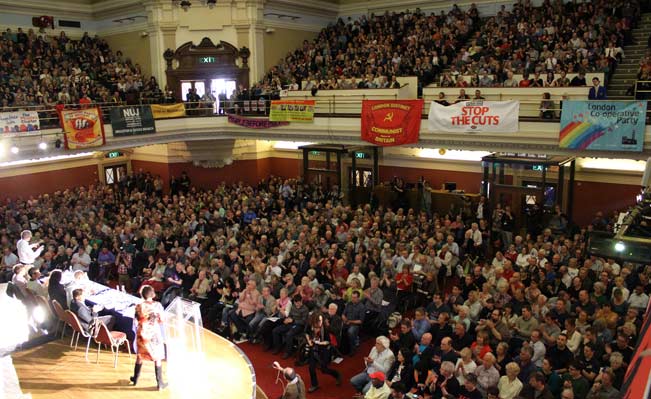 Over 4,000 people attended the founding conference of the People’s Assembly in 2013. Photograph: Jim Thatcher
Over 4,000 people attended the founding conference of the People’s Assembly in 2013. Photograph: Jim Thatcher
No solution can be really radical that attempts to avoid, diminish or circumvent the direct participation of the masses argues John Rees
What does it mean to be a radical? One answer, the obvious answer, would be that a radical is someone who rejects the existing social system and wants to see a fundamentally different alternative. There is some truth in this, but left on its own this is an insufficient definition.
For a start this would leave us with a definition which would include the radical right as well as the radical left. Fundamentalist right-wingers also want to see a wholesale transformation of the system but in ways which benefit the rich and powerful and further disadvantage working people, trade unionists, minorities and so on.
But even if we qualify the term radical by saying that we mean “left-wing radical” this is still an insufficient qualification. Do we mean that anyone who only verbally espouses a utopian vision of a better society is really a radical? Is an individual act of terrorism aimed at such a transformation really radical, for instance?
We can come up with a better approach if we go back to the dictionary definition of the word radical. Radical literally means “to get to the root of,” a thought, act or political position cannot be truly radical unless it gets to the root of the problem.
For left wingers the root of any issue, the only possibility of a radical solution, is the involvement of the mass of ordinary people. Without the direct participation of the masses, no problem can be addressed at its roots. No solution can be really radical that attempts to avoid, diminish or circumvent the direct participation of the masses.
Radical action
This is why forms of action like strikes and mass demonstrations are always the most radical. Other forms of action may have more advanced or extreme demands. Slogans may appear more confrontational. Speeches that appeal to an already revolutionary minority can always be made. Actions that look more combative can be taken by small numbers.
These can all have their place and a certain value of course. But ultimately they are forms of propaganda, either by deed or word, and therefore fall short of being the most politically effective form of action.
The Russian revolutionary Plekhanov made an important distinction between agitation, which he said is a single idea in front of a mass audience, and propaganda, which he defined as a complex of ideas in front of a small audience. What mobilises the masses is always more truly radical than that which merely activates the already politicised.
Too many on the left confuse radicalism with propaganda, imagining that a few hundred with a “radical” idea is preferable to hundreds of thousands with a simple idea like “End Austerity”. This is why they are dismissive of large so-called A to B marches or mass campaigns.
But in reality the really revolutionary approach is to combine propaganda and agitation in a dynamic way. Building a mass movement around the clearest, most basic, most popular slogans is an essential first step. No approach which rejects this in favour of the substitution of minority action (or worse, just talk) can ever be really radical.
In addition the revolutionary minority can win increased support for a fundamental transformation of society by working constructively within wider movements and at the same time arguing for a deeper and wider revolutionary approach.
This is what Counterfire has done in both initiating, sustaining and building mass movements like the People’s Assembly and the Stop the War Coalition and, at the same time, seeking to enlarge and magnify the voice of the revolutionary alternative to capitalism.
John Rees will be speaking at the Dangerous Times Festival, Saturday 27th June, 4:45pm on ‘Social Democracy, mass movements and revolution‘.
This article first appeared in issue 002 of Counterfire’s new free paper. Contact us for copies to distribute in your area.

